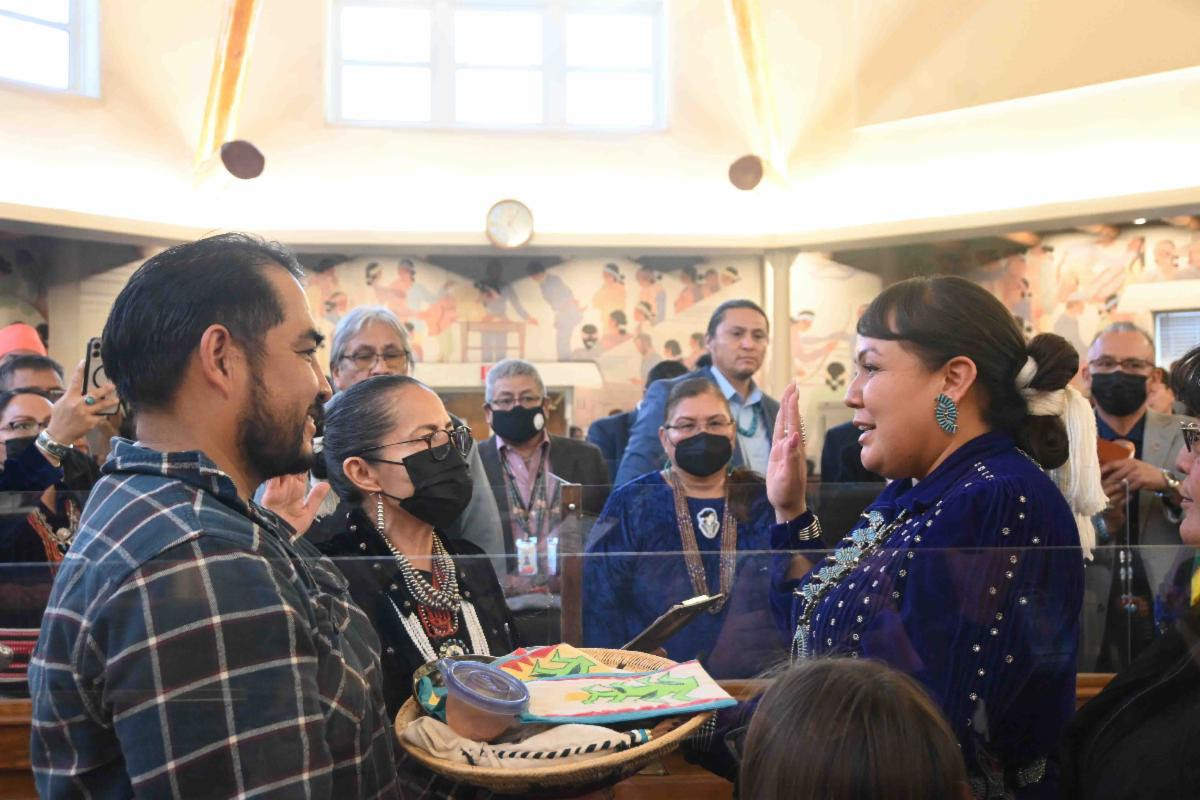
- Details
- By Levi Rickert
History was made on Tuesday when the 25th Navajo Council elected its first female Speaker ever during the opening of its Winter Council session.
The election of Crystalyne Curley as Speaker of the Navajo Council came two weeks after Richelle Montoya was sworn in as the first first-ever female vice president of Navajo Nation and nine women, including Curley, were sworn into the 25th Navajo Council.
The Speaker of the Navajo Council heads the Legislative Branch of the Navajo Nation for a two-year term.
Curley beat three opponents vying for the Speaker position. Among others nominated for Speaker were Council Delegates Eugenia Charles-Newton, Carl R. Slater, and Otto Tso. During a first vote, none of the candidates received the majority of the votes, which led to a run-off election. In the run-off election, Curley received 13 votes and Tso received eleven 11 votes.
Curley is Tsenjikini and born for To'aheedliinii. Her maternal grandfather is Kinyaa'aanii and her paternal grandfather is Dził t'aadi Kinyaa'áanii. She is originally from the community of Fish Point, Ariz., located within the Tsélání/Cottonwood Chapter. She is fluent in the English and Navajo languages.
“I extend my appreciation to my colleagues of the 25th Navajo Nation Council for having the confidence in me to lead the Legislative Branch and to serve as the Speaker of the Council,” Curley said in a statement. “We have many challenging issues to address and I look forward to working collectively with my colleagues and the other branches of government to make progress for our people and communities across the Nation. Through dedication, hard work, and prayer, the 25th Navajo Nation Council will remain committed to positive changes and accountability as we move forward together.”
During the presentation of her platform, Curley said that she strives to be a voice for Navajo people living in remote areas without basic infrastructure and amenities, which she attributed to growing up in a rural community with no electricity or running water.
Despite the challenges of growing up in such conditions, Curley earned two bachelor's degrees from Arizona State University and a Masters in Public Administration from the University of New Mexico.
 Make A Monthly Donation Here
Make A Monthly Donation Here
She previously served as a policy analyst with Diné College and the Navajo Government Development Office. In addition, she served as a Legislative District Assistant and Sr. Public Information Officer for the Office of the Speaker and Office of the President and Vice President before being elected to the Council this past November, representing the communities of Tachee/Blue Gap, Many Farms, Nazlini, Tselani/Cottonwood, and Low Mountain. From 2011-2012, she served as Miss Navajo Nation.
Curley was joined by her spouse, daughter, and mother as Navajo Nation Chief Justice JoAnn Jayne administered the Oath of Office.
More Stories Like This
Native News Weekly (August 25, 2024): D.C. BriefsNavajo Nation Mourns the Passing of Former Vice President Rex Lee Jim
Deb Haaland Earns Endorsement From Communications Workers of America Local 7076
University Soccer Standout Leads by Example
Two Native Americans Named to Democratic Congressional Campaign Committee's“Red to Blue” Program
Help us defend tribal sovereignty.
At Native News Online, our mission is rooted in telling the stories that strengthen sovereignty and uplift Indigenous voices — not just at year’s end, but every single day.
Because of your generosity last year, we were able to keep our reporters on the ground in tribal communities, at national gatherings and in the halls of Congress — covering the issues that matter most to Indian Country: sovereignty, culture, education, health and economic opportunity.
That support sustained us through a tough year in 2025. Now, as we look to the year ahead, we need your help right now to ensure warrior journalism remains strong — reporting that defends tribal sovereignty, amplifies Native truth, and holds power accountable.
 The stakes couldn't be higher. Your support keeps Native voices heard, Native stories told and Native sovereignty defended.
The stakes couldn't be higher. Your support keeps Native voices heard, Native stories told and Native sovereignty defended.
Stand with Warrior Journalism today.
Levi Rickert (Potawatomi), Editor & Publisher


